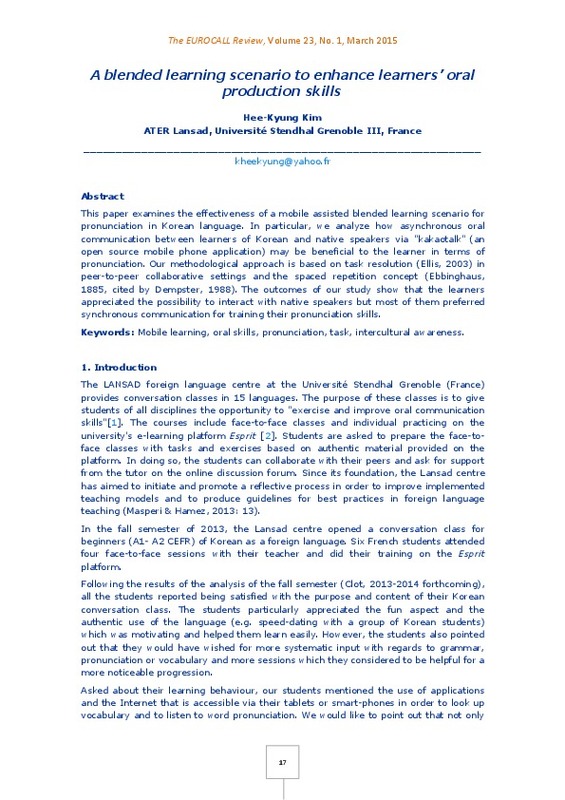JavaScript is disabled for your browser. Some features of this site may not work without it.
Buscar en RiuNet
Listar
Mi cuenta
Estadísticas
Ayuda RiuNet
Admin. UPV
A blended learning scenario to enhance learners’ oral production skills
Mostrar el registro sencillo del ítem
Ficheros en el ítem
| dc.contributor.author | Kim, Hee-Kyung
|
es_ES |
| dc.date.accessioned | 2017-05-25T11:54:23Z | |
| dc.date.available | 2017-05-25T11:54:23Z | |
| dc.date.issued | 2015-03-30 | |
| dc.identifier.uri | http://hdl.handle.net/10251/81745 | |
| dc.description.abstract | [EN] This paper examines the effectiveness of a mobile assisted blended learning scenario for pronunciation in Korean language. In particular, we analyze how asynchronous oral communication between learners of Korean and native speakers via "kakaotalk" (an open source mobile phone application) may be beneficial to the learner in terms of pronunciation. Our methodological approach is based on task resolution (Ellis, 2003) in peer-to-peer collaborative settings and the spaced repetition concept (Ebbinghaus, 1885, cited by Dempster, 1988). The outcomes of our study show that the learners appreciated the possibility to interact with native speakers but most of them preferred synchronous communication for training their pronunciation skills. Guardar / Salir Siguiente > | es_ES |
| dc.language | Inglés | es_ES |
| dc.publisher | Universitat Politècnica de València | |
| dc.relation.ispartof | The EuroCALL Review | |
| dc.rights | Reconocimiento - No comercial - Sin obra derivada (by-nc-nd) | es_ES |
| dc.subject | Mobile learning | es_ES |
| dc.subject | Oral skills | es_ES |
| dc.subject | Pronunciation | es_ES |
| dc.subject | Task | es_ES |
| dc.subject | Intercultural awareness | es_ES |
| dc.title | A blended learning scenario to enhance learners’ oral production skills | es_ES |
| dc.type | Artículo | es_ES |
| dc.date.updated | 2017-05-25T10:46:45Z | |
| dc.identifier.doi | 10.4995/eurocall.2015.4655 | |
| dc.rights.accessRights | Abierto | es_ES |
| dc.description.bibliographicCitation | Kim, H. (2015). A blended learning scenario to enhance learners’ oral production skills. The EuroCALL Review. 23(1):17-23. https://doi.org/10.4995/eurocall.2015.4655 | es_ES |
| dc.description.accrualMethod | SWORD | es_ES |
| dc.relation.publisherversion | https://doi.org/10.4995/eurocall.2015.4655 | es_ES |
| dc.description.upvformatpinicio | 17 | es_ES |
| dc.description.upvformatpfin | 23 | es_ES |
| dc.type.version | info:eu-repo/semantics/publishedVersion | es_ES |
| dc.description.volume | 23 | |
| dc.description.issue | 1 | |
| dc.identifier.eissn | 1695-2618 | |
| dc.description.references | Dempster, F. N. (1988). The spacing effect: A case study in the failure to apply the results of psychological research. American Psychologist, 43(8), 627-634. doi:10.1037/0003-066x.43.8.627 | es_ES |
| dc.description.references | Ellis, R. (2003). Task-based language learning and teaching. Oxford: Oxford University Press. | es_ES |
| dc.description.references | Helmling, B. (Ed.) (2002). L'apprentissage des langues en tandem, Didier: Paris. | es_ES |
| dc.description.references | Kukulska-Hulme, A., & Shield, L. (2008). An overview of mobile assisted language learning: From content delivery to supported collaboration and interaction. ReCALL, 20(3), 271-289. doi:10.1017/s0958344008000335 | es_ES |
| dc.description.references | Mangenot, F. & Nissen, E. (2012). La télécollaboration au service de l'apprentissage des langues. Séminaire "le numérique au service des langues", Besançon, 2-3 July 2012. | es_ES |
| dc.description.references | Van der Maren, J.M. (1999). La recherche appliquée en pédagogie: des modèles pour l'enseignement. Bruxelles: De Boeck. | es_ES |
| dc.description.references | Zedda, P. (2006). La langue chantée: un outil efficace pour l'apprentissage et la correction phonétique. Les Cahiers de l'Acedle, 2, pp.1-26. | es_ES |








